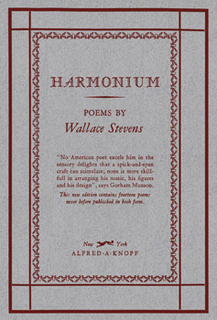Related Research Articles

Wallace Stevens was an American modernist poet. He was born in Reading, Pennsylvania, educated at Harvard and then New York Law School, and he spent most of his life working as an executive for an insurance company in Hartford, Connecticut. He won the Pulitzer Prize for Poetry for his Collected Poems in 1955.

Harmonium is a book of poetry by American poet Wallace Stevens. His first book at the age of forty-four, it was published in 1923 by Knopf in an edition of 1500 copies. This collection comprises 85 poems, ranging in length from just a few lines to several hundred. Harmonium was reissued in 1931 with three poems omitted and fourteen new poems added.
"The Paltry Nude Starts on a Spring Voyage" is a poem from Wallace Stevens's first book, Harmonium. Originally published in 1919, it is in the public domain. Despite general agreement that it is indebted to Botticelli's The Birth of Venus, there is uncertainty about the nature of the debt.
"The Ordinary Women" is a poem from Wallace Stevens's first book of poetry, Harmonium.
"Le Monocle de Mon Oncle" is a poem from Wallace Stevens's first book of poetry, Harmonium. It was first published in 1918.
"The Doctor of Geneva" is a poem from Wallace Stevens's first book of poetry, Harmonium (1923). The poem was first published in 1921, so it is free of copyright.
"The Comedian as the Letter C" is a poem from Wallace Stevens's first book of poetry, Harmonium (1923). It was one of the few poems first published in that collection and the last written for it. John Gould Fletcher frames the poem as expressing Stevens's view "that the artist can do nothing else but select out of life the elements to form a 'fictive' or fictitious reality."
"The Jack-Rabbit" is a poem from Wallace Stevens's first book of poetry, Harmonium (1923).
"The Apostrophe to Vincentine" is a poem from Wallace Stevens's first book of poetry, Harmonium (1923). It was first published before 1923 and is therefore in the public domain according to Librivox.
"Anecdote of Canna" is a poem from Wallace Stevens's first book of poetry, Harmonium (1923).
"Anecdote of the Prince of Peacocks" is a poem from Wallace Stevens's first book of poetry, Harmonium (1923). It was one of the few Harmonium poems first published in that volume, so it is still under copyright. However, it is quoted here as justified by Fair use to facilitate scholarly commentary.
"Sunday Morning" is a poem from Wallace Stevens' first book of poetry, Harmonium. Published in part in the November 1915 issue of Poetry, then in full in 1923 in Harmonium, it is now in the public domain. The first published version can be read at the Poetry web site: The literary critic Yvor Winters considered "Sunday Morning" "the greatest American poem of the twentieth century and... certainly one of the greatest contemplative poems in English".
"Bantams in Pine-Woods" is a poem from Wallace Stevens's first book of poetry, Harmonium. It was first published in 1922 in the poetry journal Dial, along with five other poems, all under the title "Revue". It is in the public domain.
"Anecdote of the Jar" is a poem from Wallace Stevens's first book of poetry, Harmonium. First published in 1919, it is in the public domain.
"Life is Motion" is a poem from Wallace Stevens's first book of poetry, Harmonium. It was first published in 1919, so it is in the public domain.
"To the One of Fictive Music" is a poem from Wallace Stevens's first book of poetry, Harmonium. First published in 1922, it is in the public domain.
"Hymn From A Watermelon Pavilion" is a poem from Wallace Stevens's first book of poetry, Harmonium. It was first published in 1917, so it is in the public domain.
"The Man Whose Pharynx Was Bad" is a poem from Wallace Stevens's first book of poetry, Harmonium. First published in 1921, it is in the public domain in the United States.
"The Death of a Soldier" is a poem from Wallace Stevens's first book of poetry, Harmonium. The poem uses free verse to describe the death of a soldier.
"Sea Surface full of Clouds" is a poem from the second, 1931, edition of Wallace Stevens's first book of poetry, Harmonium. It was first published in 1924, so it is restricted by copyright. However, brief parts of it are quoted here as fair use, and the whole poem is available elsewhere on the Internet.
References
- Buttel, Robert. Wallace Stevens: The Making of Harmonium. 1967: Princeton University Press.
- Stevens, Wallace. In Letters of Wallace Stevens, ed. Holly Stevens. 1966: University of California Press.
- Vendler, Helen. Words Chosen Out of Desire. 1984: University of Tennessee Press.
- Morse, Samuel French. "Wallace Stevens, Bergson, Pater". ELH, Vol. 31, No. 1.